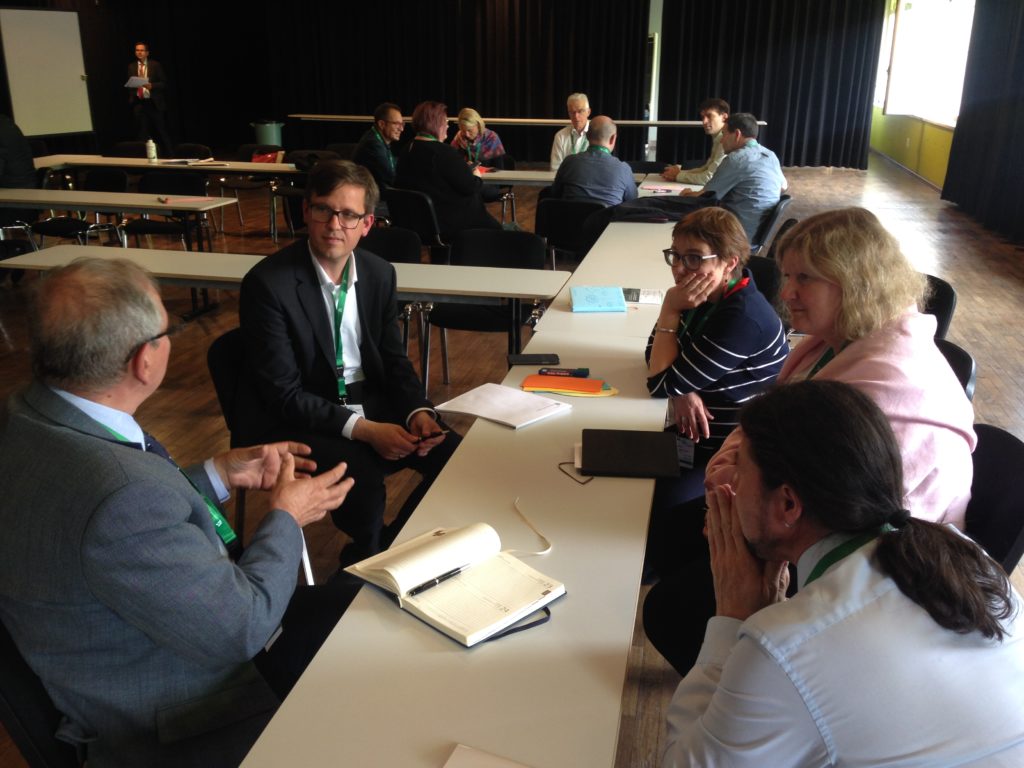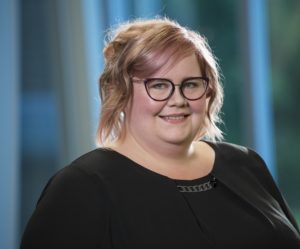Collected valuable input during the first E-LAND workshop
By Moritz Loock/Heidi Tuiskula/Mari Kristine Buckholm 18. June 2019
In the end of May, E-LAND successfully organized the first of eight workshops planned in the EU project. With the title “Digital B2B & B2G prosumer business models”, it was the first business model related workshop and precious input was collected to support the development of the project.
The E-LAND workshop was organized by Heidi Tuiskula (Senior Researcher and International Project Manager, Smart Innovation Norway) and Dr. Moritz Loock (University of St. Gallen) during the St. Gallen Forum for Management of REM on May 24th 2019.
“22 E-LAND project stakeholders and interested executives from the energy industry took part in the workshop. From the E-LAND project, partners representing different technical backgrounds joined the workshop to discuss and represent the project,” explains Tuiskula.
The workshop was dedicated to a discussion of business and exploitation prospects of the E-LAND project and to deploy the project’s potential. For that, the workshop was set to create awareness and fine tune the value proposition and business model development of E-LAND.
Discussion groups
The workshop started with an introduction given by Dr. Moritz Loock of University of St. Gallen. Then Heidi Tuiskula, scientific coordinator of the E-LAND project, introduced the project in more detail, followed by a presentation by representatives of the three different E-LAND pilot-sides in Spain, Norway and Romania.
In the following interactive part, the workshop participants discussed the potential of E-LAND in different groups. These questions regarding the E-LAND business model led the workshop discussion:
| Value proposition | Monetization | Sustainability |
| What problems can be addressed/ What useful solutions does digital technology provide? | How can money be earned, what is the revenue logic? | What is the broader sustainable impact (3Ps)? |

During the workshop, the participants discussed different questions regarding the E-LAND business model.
The workshop participants collected the outcome of each different discussion group. Two important dimensions were highlighted.
Starting point of business model development and implantation?
During the discussion it became clear that two different approaches in the development of the E-LAND pilot sites are at work. Both approaches differ according to their starting point. One approach starts with technology (e.g. the potential of the tools developed, and the platform as provided).
“The development in that case is a search process of instances at the pilot site where the technology can be used or applied for. The other approach starts with an actual problem (e.g. reliability of the grid, integration of large shares of renewables). The development in this case seeks to find solutions for the problem and investigates how E-LAND tools and theories can help to solve the problem,” Tuiskula points out.
The workshop participants agreed that the two approaches could complement each other but are important to acknowledge.
Promotion of a central business model vs. decentral emergence
“Another important difference that was discussed during the workshop was that, in some cases, a business model is developed and then promoted to the different pilot sites. In that sense it is pre-packed set of services that is then offered to the world. In contrast, and this was especially highlighted as a potential for the Romanian case, an alternative model would introduce local business actors and interested parties to ‘try out’ the E-LAND functionality, explains Tuiskula. She adds:
“During the testing, local stakeholders would start to create ideas for application, modify the existing tools and ultimately contribute to the local emergence of business models. Both approaches were found to be feasible in E-LAND, but it was acknowledged that both would require different and complementary support from the E-LAND project.”
The results of the workshop have been reported back to the project and will stimulate further discussion and implementation effort across the project. In addition, three potential members of the Stakeholder Innovation Group (SIG) have been identified and invited to join.

Heidi Tuiskula.
Ownership of different tools and ancillary services
Questions around possible ownership of tools, how the tools can be utilized, by who, and different ancillary services connected to E-LAND, were also illuminated in the workshop. Management of storage vectors was especially seen as an interesting enabler for novel services and local business creation.
Another interesting discussion was risen around the topic of whether E-LAND is a threat or a possibility to the traditional utilities selling energy to customers.
“This reflects well to the current landscape of the transformation of the energy sector. For sure, technologies enabling better local utilization of assets will change the traditional centralized production and distribution business. It is up to the utilities to transform and grasp the new business opportunities our project will open.,” emphasizes Tuiskula.
Social media
E-LAND updates